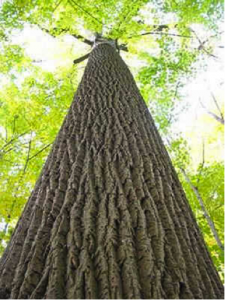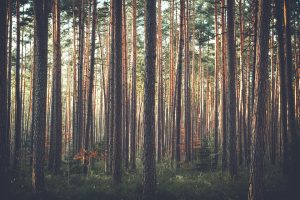
Thoreau acted on what many of us also know: rediscovering the ground of silence by retreating into a forest offers a chance to rebalance, to reawaken selves diminished by the clutter of messages that ceaselessly intrude.
In his recent best-selling book, The Hidden Life of Trees (2016), Peter Wohlleben explains why he is so passionate about the verdant world of the forest. Mostly he wants to marvel at a kind of biological intentionality that has trees “talking” to each other, aggregating in communities, nurturing the weakest and the wounded, and finding ways to protect themselves from invaders. In Wohlleben’s world “mother” trees keep their nearby offspring small by denying the light they need to grow quickly. The slow growth mandated by the sun-blocking canopy of the parent has the effect of hardening the wood structure in the offspring. That will add years to its life when the older tree falls and allows a direct path to the sun. Like so much in the biological world, trees are “smart” in the ways they need to be smart. And while I would quarrel a bit with a language of intention that works better for sentient beings than plants, we can’t help but share his admiration for these living structures. Trees are the heroes of the planet for their longevity, their towering height and beauty, their life-giving oxygen, and their capacity to regenerate even when abused by animals and humans. Thankfully, not all humans.
For decades some Japanese have engaged in a practice of “forest bathing.” This is less a form of exercise than a simpler act of pausing to absorb the wonder of a wooded hillside. This involves, as they say, “being in the moment,” lingering in a setting that offers psychological breathing space. In addition, the transpiration-infused air of a forest is said to have its own restorative attributes.
For some time my family has lived on several acres within an expansive wooded valley. But only recently have I fully appreciated the 100-foot tall poplars that stand as sentinels along the pathway to our house. Their tall trunks are ramrod straight, with branches and leaf canopies too high to fully appreciate from the ground. I marvel at how they’ve managed to endure all that human encroachment has thrown at them. We rarely take the time, but more often we should stand at their bases in a conscious tribute to their magnificence.
Treks deep into the woods obviously function for the simple pleasure of spending time in the cool shade of these giants.

Perhaps pausing at the foot of a tree is a start in the direction of forest bathing. Americans have other names for it as well. Fishing, hunting and camping come to mind. The ruddy gamesmen loaded to the teeth with various armaments would probably reject the label of “tree hugger.” But hug them they do as they make their way along angled forest floors. Treks deep into the woods obviously function for the simple pleasure of spending time in the company of these giants.
The relevant communication lesson here lies in the perspective we regain when we withdraw into the natural world. “I went to the woods because I wished to live deliberately,” Henry David Thoreau famously observed. For him the company of others was too much of a distraction, as were the new products of the information age delivered by the rapidly expanding telegraph. He acted on a premise that many of us also know: silence offered by a retreat into a forest offers a chance to rebalance, to reawaken selves diminished by the clutter of messages that ceaselessly intrude.
And, of course, a forest’s presence is its own reward. It’s lushness, smell and density give us an existential lift. In the natural world we are again of a place and not just in it. We are home with the elements of life-support we already know. I sense this accutely after what is usually brief rain shower in the Rockies, where lodgepole pines add an indescribably clean scent to the thin air. Fortunately for nearly all of us, communities of trees are close by. Standing among them is to acknowledge that we are but one biological form paying homage to another, each extraordinary in their own ways.
Comments: woodward@tcnj.edu